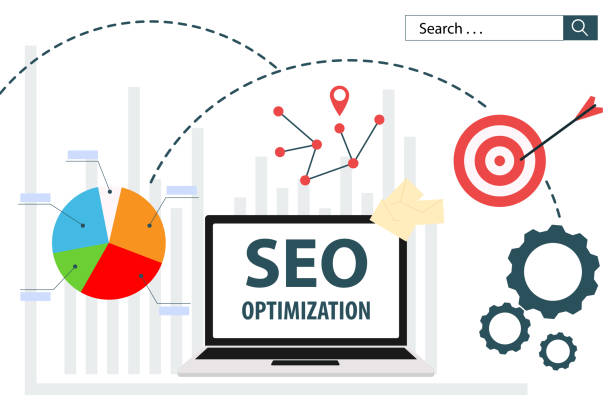What is SEO and why is it important?

What is SEO and why is it important?
#SEO (Search Engine Optimization) refers to a set of activities that are performed to improve the ranking of a website in search engine results like Google.
The main goal of SEO is to increase organic (free) website traffic by achieving higher rankings in search engine results pages (SERP).
The importance of SEO stems from the fact that most internet users use search engines to find information, products, or services they need.
If your website is not visible in search results, you will miss a great opportunity to attract audiences and customers.
Also, organic traffic usually has a higher conversion rate than paid traffic because users who enter your website through search are more likely to be looking for something you offer.
In today’s world, SEO is no longer an option, but a necessity for any business that wants to succeed in the online space.
A strong SEO strategy can help you introduce your brand, increase your credibility, and dramatically increase your sales.
To better understand SEO, read Wikipedia.
Did you know that 94% of users’ first impressions of a business are related to its website design? With professional corporate website design by **Rasaweb**, turn this initial impression into an opportunity for growth.
✅ Attract more customers and increase sales
✅ Create credibility and trust in the eyes of the audience⚡ Get free website design consultation!
Basics of search engines and how they work

Basics of search engines and how they work
Search engines like Google, Bing, and Yahoo are complex software programs designed to find, organize, and present information on the web.
They use three main steps to do this:
- Crawling Search engines use programs called crawlers or bots to find web pages across the internet.
These crawlers go from page to page through links and collect information from each page. - Indexing After crawling, search engines store the collected information in a large database called an index.
At this stage, the information on each page is analyzed, and keywords, structure, and other important factors are identified. - Ranking When a user enters a search query, search engines check their index to find the most relevant pages.
Then, they rank these pages based on their complex algorithms and display the results to the user.
To get your website seen in search results, you need to help search engines easily find your pages, understand them, and rank them correctly.
Understanding how search engines work is the first step to SEO.
Google is a great resource for detailed information on how search engines work.
Keyword research finding the best opportunities

Keyword research finding the best opportunities
Keyword Research is the process of identifying and selecting the words and phrases that users use to search in search engines.
This process is one of the most important steps in SEO because it helps you optimize your website content for the words your audience is looking for.
By doing keyword research, you can:
- Identify the words and phrases that are searched most often.
- Evaluate the competition for each keyword.
- Discover new opportunities for content production.
- Better understand your target audience.
There are various tools for keyword research, including Google Keyword Planner, Ahrefs, SEMrush, and Moz Keyword Explorer.
Each of these tools has its own features and capabilities, but they all help you find the right keywords for your website.
Choosing the right keywords for SEO can have a significant impact on increasing your website traffic.
| Keyword | Monthly Search Volume | Competition |
|---|---|---|
| SEO training | 5000 | Medium |
| Website optimization | 3000 | High |
| SEO website | 8000 | Medium |
| Long-tail Keyword | Description |
|---|---|
| SEO training for beginners | Step-by-step SEO training for people who are just starting out. |
| Best SEO practices 2024 | New and effective techniques to improve site ranking in 2024. |
On-page SEO content and site structure optimization

On-page SEO content and site structure optimization
On-Page SEO refers to a set of actions you take within your website to improve its ranking in search results.
These actions include optimizing content, site structure, title tags, meta descriptions, and other related factors.
On-page SEO helps search engines better understand your website content and rank it correctly.
The most important factors of on-page SEO are:
- Quality content Your content should be valuable, relevant, and unique.
It should answer users’ questions and meet their needs. - Keywords Use keywords naturally in titles, subtitles, body text, and meta descriptions.
- Title Tags Title Tags are the most important factor of on-page SEO.
Each page should have a unique title tag that is relevant to its content. - Meta Descriptions Meta Descriptions are summaries of the page’s content that are displayed in search results.
An attractive meta description can encourage users to click on your link. - Site Structure Your site structure should be logical and user-friendly.
Users should be able to easily navigate your site and find the information they need. - Site Speed Site loading speed is an important ranking factor.
A site that loads quickly provides a better user experience and users are more likely to stay on it.
By optimizing on-page SEO, you can improve your website’s ranking in search results and attract more organic traffic.
SEO is an ongoing process that requires updates and adaptation to changes in search engine algorithms.
Website optimization is a necessity.
Are you tired of your online store not generating as much revenue as its potential? Rasaweb, a specialist in professional online store website design, will solve this problem forever!
✅ Increase sales rates and revenue
✅ High loading speed and unparalleled user experience
⚡ Get free online store website design consultation
Off-page SEO creating credibility and link building

Off-page SEO creating credibility and link building
Off-Page SEO refers to a set of actions you take outside of your website to improve its ranking in search results.
The most important factor in off-page SEO is Link Building.
Link building means getting links from other websites to your website.
The higher the number and quality of inbound links to your website, the more credible it becomes in the eyes of search engines, and its ranking in search results improves.
There are various methods for link building, including:
- Creating valuable content If your content is valuable and unique, other websites are more likely to link to it.
- Content marketing Share your content on social networks, blogs, and other online channels.
- Building relationships Connect with other bloggers and website owners and ask them to link to your content.
- Participating in online forums and groups Participate in online forums and groups related to your industry and place your website link in your signature.
- Submitting to directories Register your website in online directories.
When link building, pay attention to the quality of the links.
Quality links come from reputable websites that are relevant to your industry.
Poor quality links from spam and irrelevant websites can harm your website’s ranking.
SEO of the site with correct link building can increase the site’s credibility.
Mobile optimization responsive design

Mobile optimization responsive design
Given the increasing use of mobile devices for searching the internet, optimizing your website for mobile (Mobile Optimization) is one of the most important factors in SEO.
Google and other search engines rank websites that are optimized for mobile higher in search results.
To optimize your website for mobile, you should use Responsive Design.
Responsive design means that your website automatically adapts to the screen size of the user’s device.
A responsive website displays correctly on all devices, including mobile, tablet, and desktop.
In addition to responsive design, you should also pay attention to the following:
- Loading speed Your website should load quickly on mobile.
- Easy navigation Your website navigation should be easy and user-friendly on mobile.
- Readable fonts Use readable fonts and appropriate text sizes.
- Optimized images Optimize your images for mobile to reduce their size and increase the loading speed of your website.
Optimizing a site for mobile is essential.
Competitor analysis identifying strengths and weaknesses

Competitor analysis identifying strengths and weaknesses
Competitor Analysis means reviewing and evaluating the websites and SEO strategies of your competitors.
By conducting competitor analysis, you can identify their strengths and weaknesses and use them to improve your own SEO strategy.
This process involves reviewing the keywords used by competitors, their content, their inbound links, and other related factors.
To perform competitor analysis, you can use various tools, including:
- Ahrefs
- SEMrush
- Moz Keyword Explorer
- Google Search Console
Using these tools, you can collect the following information about your competitors:
- Keywords they are ranking for.
- Content they produce.
- Links they receive from other websites.
- Traffic they receive from search engines.
- Social networks in which they are active.
By analyzing this information, you can identify the strengths and weaknesses of your competitors and use them to improve your own SEO strategy.
Effective SEO with competitor analysis can help you outperform them.
| Competitor Name | Strengths | Weaknesses |
|---|---|---|
| Competitor #1 | Quality content, strong link building | Poor site structure, low speed |
| Competitor #2 | High speed, responsive design | Low content, inappropriate keywords |
SEO tools introduction and how to use them

SEO tools introduction and how to use them
SEO Tools help you make the SEO process easier and more effective.
These tools provide valuable information about your website, your competitors, and the keywords used by users.
Using these tools, you can identify the strengths and weaknesses of your website, discover new opportunities to improve your ranking, and optimize your SEO strategy.
Some of the most popular SEO tools are:
- Google Search Console A free tool from Google that helps you track your website’s performance in search results.
- Google Analytics A free tool from Google that helps you analyze your website traffic and understand user behavior on your site.
- Ahrefs A paid tool that helps you check the inbound links to your website and your competitors, identify the keywords they are using, and track their performance on social networks.
- SEMrush A paid tool that helps you find the right keywords for your website, evaluate the competition for each keyword, and track your website’s ranking in search results.
- Moz Keyword Explorer A paid tool that helps you find the right keywords for your website and assess the level of competition for each keyword.
Choosing the right tool for SEO depends on your needs and budget.
You can improve your website SEO by using these tools.
Are you losing potential customers due to an unprofessional website? Rasaweb is your answer! With our specialized corporate website design services:
✅ Enhance your business’s credibility and position
✅ Experience attracting more targeted customers
⚡ Act now to receive a free consultation!
Measuring and analyzing SEO results

Measuring and analyzing SEO results
Measuring and analyzing SEO Results Measurement and Analysis is essential to understand whether your SEO strategy is effective or not.
By measuring and analyzing the results, you can identify the strengths and weaknesses of your strategy and optimize it for improved performance.
Correct analysis helps SEO to achieve the desired result.
The most important metrics to track for measuring your SEO results are:
- Organic traffic The amount of traffic that enters your website from search engines.
- Keyword ranking Your website’s ranking for the desired keywords in search results.
- Conversion rate The percentage of users who perform a desired action after entering your website, such as buying a product, subscribing to a newsletter, or filling out a contact form.
- Bounce rate The percentage of users who leave your website immediately after entering a page.
- Time on site The amount of time users spend on your website.
To measure these metrics, you can use various tools, including Google Analytics and Google Search Console.
By analyzing this information, you can better understand the performance of your website’s SEO and optimize your strategy for improved performance.
SEO is an iterative process.
The future of SEO and new trends

The future of SEO and new trends
SEO is a dynamic and changing field.
Search engine algorithms are constantly being updated, and new trends are emerging.
To be successful in SEO, you need to be aware of these changes and adapt your strategy to them.
Some of the new SEO trends are:
- Voice search With the increasing use of voice assistants like Siri and Alexa, voice search is increasing.
To optimize your website for voice search, you should use longer and more conversational keywords and answer users’ questions directly. - Artificial intelligence Search engines use artificial intelligence to better understand the content of websites and provide more relevant search results.
To optimize your website for artificial intelligence, you should produce quality and valuable content that answers users’ questions and meets their needs. - User experience User experience (UX) is an important ranking factor.
Search engines rank websites that offer a better user experience higher in search results.
To improve the user experience of your website, you should increase the loading speed of the site, make navigation easier, and use responsive design.
By being aware of these new trends, you can optimize your SEO strategy for success in the future.
SEO is more than just a technique; it’s an art.
FAQ
| Question | Answer |
|---|---|
| What is SEO? | SEO or Search Engine Optimization, is a process for increasing the quality and quantity of website traffic by improving the site’s ranking in the natural (organic) results of search engines such as Google. |
| What are the main types of SEO? | SEO is divided into three main categories: On-Page SEO, Off-Page SEO, and Technical SEO. |
| What does On-Page SEO include? | On-Page SEO includes optimizing elements within the website, such as keywords, page title (Title Tag), meta descriptions (Meta Description), content, URL structure, images, and internal links. |
| What is Off-Page SEO? | Off-Page SEO refers to activities outside of the website that help improve its ranking, such as backlink building (Backlink Building), social media marketing, and brand mentions (Brand Mentions). |
| What is Technical SEO? | Technical SEO deals with optimizing the technical aspects of the website to help search engines crawl and index it better. This includes site speed, mobile-friendliness, site structure, sitemaps (Sitemap), and Robots.txt file. |
| What role do keywords play in SEO? | Keywords are phrases that users enter in search engines. Correct and targeted use of relevant keywords in the content and elements of the site helps search engines understand the topic of your page and display it to relevant searches. |
| What is a backlink and why is it important? | A backlink or incoming link is a link from one website to another. Backlinks act as a “vote of confidence” from other sites to search engines and play an important role in the credibility and ranking of the site, especially if they are from reputable sites. |
| What effect does quality content have on SEO? | Quality, relevant, comprehensive, and unique content not only attracts and retains users, but also shows search engines that your page is valuable. This helps improve ranking, reduce bounce rate (Bounce Rate), and increase user time on the site. |
| Why is site loading speed important for SEO? | Site loading speed is an important ranking factor for Google. Faster sites provide a better user experience, have lower bounce rates, and are preferred by search engines. |
| Is SEO a one-time process? | No, SEO is an ongoing and long-term process. Search engine algorithms are constantly changing, competition is increasing, and site content also needs updating. Therefore, SEO requires continuous monitoring, analysis, and optimization. |
And other services of Rasa Web advertising agency in the field of advertising
Smart Google Ads: Designed for businesses looking to analyze customer behavior through marketing automation.
Smart Digital Branding: An effective tool for digital branding with attractive user interface design.
Smart Marketing Automation: A dedicated service for growing website traffic based on intelligent data analysis.
Smart Reportage: A combination of creativity and technology to increase click-through rates by using real data.
Smart Reportage: Professional optimization for analyzing customer behavior using precise audience targeting.
And more than hundreds of other services in the field of internet advertising, advertising consulting and organizational solutions
Internet Advertising | Advertising Strategy | Advertorial
Resources
What is SEO? Zitel
,SEO Training Nikan Sepehr
,What is SEO? Raya Marketing
,What is SEO? Faraz Network
? Are you ready to transform your business in the digital world? Rasaweb, with expertise in comprehensive digital marketing services including corporate website design, paves the way for your growth.
📍 Tehran, Mirdamad Street, next to the Central Bank, Southern Kazerun Alley, Ramin Alley No. 6



